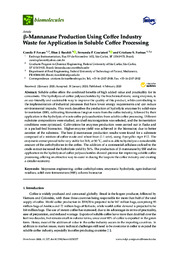Beta-Mannanase production using coffee industry waste for application in soluble coffee processing.
Beta-Mannanase production using coffee industry waste for application in soluble coffee processing.
Author(s): FAVARO, C. P.; BARALDI, I. J.; CASCIATORI, F. P.; FARINAS, C. S.
Summary: Soluble coffee offers the combined benefits of high added value and practicality for its consumers. The hydrolysis of coffee polysaccharides by the biochemical route, using enzymes, is an eco-friendly and sustainable way to improve the quality of this product, while contributing to the implementation of industrial processes that have lower energy requirements and can reduce environmental impacts. This work describes the production of hydrolytic enzymes by solid-state fermentation (SSF), cultivating filamentous fungi on waste from the coffee industry, followed by theirapplication in the hydrolysis of waste coffee polysaccharides from soluble coffee processing. Different substrate compositions were studied, an ideal microorganism was selected, and the fermentation conditions were optimized. Cultivations for enzymes production were carried out in flasks and in a packed-bed bioreactor. Higher enzyme yield was achieved in the bioreactor, due to better aeration of the substrate. The best ?-mannanase production results were found for a substrate composed of a mixture of coffee waste and wheat bran (1:1 w/w), using Aspergillus niger F12. The enzymatic extract proved to be very stable for 24 h, at 50 ?C, and was able to hydrolyze a considerable amount of the carbohydrates in the coffee. The addition of a commercial cellulase cocktail to the crude extract increased the hydrolysis yield by 56%. The production of ?-mannanase by SSF and its application in the hydrolysis of coffee polysaccharides showed promise for improving soluble coffeeprocessing, offering an attractive way to assist in closing the loops in the coffee industry and creating a circular economy.
Publication year: 2022
Types of publication: Journal article
Unit: Embrapa Instrumentation
Observation
Some of Embrapa's publications are published as ePub files. To read them, use or download one of the following free software options to your computer or mobile device. Android: Google Play Books; IOS: iBooks; Windows and Linux: Calibre.
Access other publications
Access the Agricultural Research Database (BDPA) to consult Embrapa's full library collection and records.
Visit Embrapa Bookstore to purchase books and other publications sold by Embrapa.

